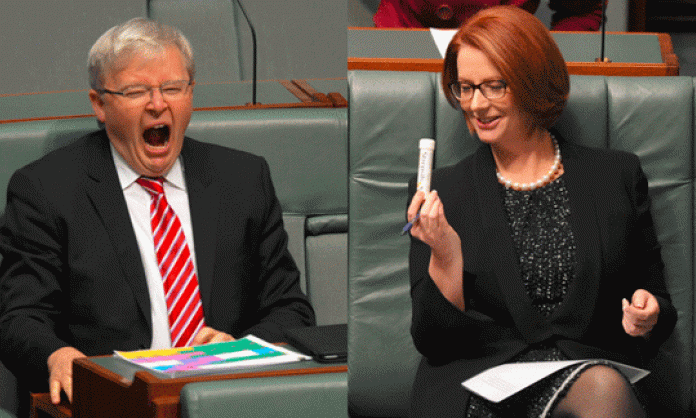Does Kevin Rudd need to consult a psychoanalyst? Was he so spent physically and psychologically after two years as prime minister that he was incapable of functioning, or is he a deeply resilient person?
And is Julia Gillard telling the truth when she says that she was a reluctant conscript in the factional manoeuvring to replace him as leader in 2010?
Frankly, I don’t give a damn. When one compares their two prime ministerships, they were both as bad as each other.
But trivial though these issues are in the grander scheme of the lives of millions of Australians, whose interests these politicians were meant to be serving, they are central to The Killing Season, a three-part series on the Rudd and Gillard governments, and the poisonous relationship between them, which is currently being screened on the ABC.
Although praised to the skies by seasoned journalists, The Killing Season is dull and filled with trivia. Its one virtue is that it demonstrates the intellectual and spiritual desert that lies at the heart of the ALP.
In the 160 minutes so far screened, the main protagonists seem committed to only one thing: advancing their positions and those of their allies, and tearing down their opponents within the party.
This is a reflection not just of the superficial nature of most political coverage in Australia today, of which The Killing Season is quite typical, with its tittle-tattle and mutual back scratching between politicians and corporate media. It also matches the reality of life inside the party, from its lowest reaches to its upper echelons.
No questions of ideology or political principle ever appear to form the basis of alliances and enemies in this political soap opera. So Rudd and Gillard were initially the “dream team” of Queensland right and Victorian left, as were their replacements as prime minister and deputy less than three years later, Gillard and Wayne Swan. Did anything change as Labor went from Rudd to Gillard and back to Rudd again, just in time for the party’s convincing defeat in 2013?
That factional adversaries could coexist quite happily until caucus members began to fear for their seats is testimony to the fact that every faction and every leading figure in the party is completely committed to neoliberal capitalism.
It was never the case that the Rudd government was “tamed” by the system. It was dedicated to serving it from the outset. Rudd was promoted within the party not on the basis that he would challenge the Liberal government’s agenda but that he would be a fresh face continuing most of it.
As Rudd’s press secretary Lachlan Harris put it in the first episode, “Forget about being the destroyer of [former Liberal prime minister] John Howard and be the son of Howard”.
Rudd’s appeal, according to a political adviser interviewed by journalist Sarah Ferguson, was “not about the working class. It had to be about the aspirational voter, and he fitted that perfectly”.
In case that wasn’t clear, Rudd is shown telling a party conference on the eve of the 2007 election, to loud applause, “I am an economic conservative”. Rudd slammed Howard and his treasurer Peter Costello at the conference for their alleged profligacy. “This sort of reckless spending must stop”, he said.
This promise of austerity was blown out of the water by the 2008-09 global financial crisis. The Rudd government splashed out tens of billions of dollars in stimulus measures and bank guarantees.
But even here the priorities of the government were clear. The stimulus package had nothing to do with redistribution from the capitalist class to the working class. It was all about saving the banks, which, to this day, are still afforded government guarantees that boost their profits by billions of dollars.
The “pink batts” roof insulation scheme backfired on Rudd because four workers lost their lives during domestic installations. This was predictable given that the scheme was a licence to print money for hundreds of shonky operators who sprang up to grab the funds without any oversight for safety.batts” roof insulation scheme backfired on Rudd because four workers lost their lives during domestic installations. This was predictable given that the scheme was a licence to print money for hundreds of shonky operators who sprang up to grab the funds without any oversight for safety.
That the big spending should have formed part of a program of public works, rather than being handouts to private contractors and big infrastructure companies, is never even raised in The Killing Season. The show’s makers share the same neoliberal worldview as their subjects.
Rudd got an early boost soon after taking office when he made the apology to the Stolen Generations in parliament. It’s notable that this was probably the only time that he elicited any genuine affection from the Australian public. But, typically, the apology was hollow. Compensation was explicitly ruled out, and racist policies such as the Northern Territory intervention were continued.
The Killing Season shows Rudd consoling victims of the 2009 Victorian bushfires. There is no such compassion for asylum seekers, who were punished with ever more vicious treatment at the hands of this self-styled moral paragon.
Rather than focus on the fate of those fleeing persecution, however, The Killing Season is more interested in whether Gillard approved or disapproved of the way in which the refugee issue was handled within cabinet.
By early 2010, Rudd was in trouble, as the ALP’s lead over the Coalition ebbed away. Facing the prospect of being turfed out of office at the forthcoming election, the right wing factions began to manoeuvre to install Gillard as party leader and prime minister.
The contest for support in the autumn and winter of 2010 only highlighted the complete absence of any principled politics in the ALP. Neither stood for anything other than power and electoral survival.
Rudd’s distance from the unions was to his advantage during his rise to the leadership, as it enabled him to present himself as someone who stood above the factions. It was also the key to his downfall. The right in the caucus, the AWU and sections of the left all got behind Gillard.
Rudd’s caucus support, based in earlier years on his presumed electoral popularity, collapsed in a matter of days, forcing him to stand down before a spill could take place.
No one comes out looking good from The Killing Season. And that’s how it should be. All the main players are nasty, self-obsessed liars who have made careers out of self-promotion and subservience to the bosses.
It’s a bit rich for Rudd to complain now, and hypocritical given that he was the wealthiest of any Labor prime minister. But his bitter reflection that “comrades Bitar and Arbib”, his NSW right wing nemeses, who both quit politics in 2011-12, were “now employed by James Packer’s casino empire” tells us about the world of ALP politics today. Years of serving big business open the door to plum jobs in the corporate world.
Little wonder that people hate politicians. And little wonder that the ALP is a shell of what it once was. Standing for nothing and infested by self-promoters who want only to get their snouts in the trough, the party is incapable of rousing a flicker of enthusiasm.





